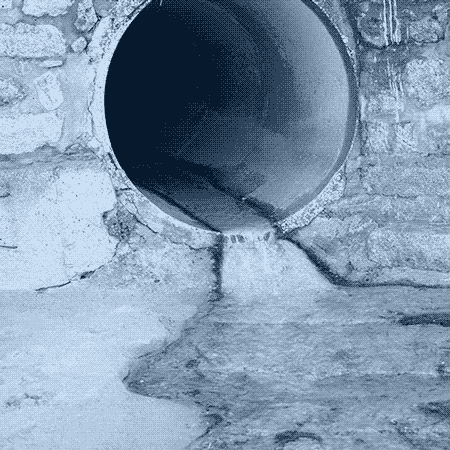a risk to the health of users and aquatic ecosystems

Bacteriological pollution poses a major threat to the quality of our surface waters and the ocean in general.
This microbiological contamination, mainly of faecal origin, comes largely from four sources: inadequately treated wastewater discharges, intensive agriculture with the use of organic fertilisers, recreational boating and commercial shipping.
These various types of pollution introduce pathogenic bacteria such as Escherichia coli and intestinal enterococci into the environment, which are carried by watercourses to the ocean. The impacts are twofold: they directly threaten the health of users through the risk of skin infections and gastrointestinal disorders, and they seriously disrupt ecosystems by promoting eutrophication and compromising aquatic biodiversity.
In view of these health and environmental challenges, enhanced monitoring of water microbiological quality, changes in regulations and more rigorous and systematic prevention of identified sources of pollution are needed to effectively protect the ocean and the health of users.
For years, Surfrider has been denouncing the inadequacy of current regulatory measures to combat bacteriological pollution. Although the Bathing Water Directive focuses on two bacteriological criteria (*E. coli* and intestinal enterococci), it has major shortcomings, which the association detailed in its European Manifesto for Healthy Waters submitted to the European Commission in 2021.
Bacteriological quality control is currently limited to the summer period (June-September) and only to officially designated bathing areas. This approach excludes the millions of people who enjoy water sports (surfing, paddleboarding, snorkelling) who engage in these activities all year round and often outside these monitored areas, even though they are more frequently exposed to the risks of contamination. Furthermore, the occasional analyses carried out during the summer do not allow for the effective identification of sources of contamination or targeted intervention on the structural causes of pollution.
In response to these regulatory shortcomings, Surfrider has developed a concrete response by initiating a monitoring network dedicated to the bacteriological quality of coastal waters. This system, which combines scientific rigour and citizen engagement, is one of the pillars of the association’s action for the health protection of users.
The results of this monitoring play a key role in informing the public and guiding environmental policies. Surfrider uses this data to quickly identify contaminated areas and warn users via appropriate communication tools, such as beachside displays, online platforms and mobile applications. The association also uses these results to work closely with local authorities and policy makers, documenting pollution incidents and advocating for targeted action at the source of contamination.
Surfrider is calling for a profound change in the European regulatory framework concerning the monitoring of water microbiological quality.
The association is calling for:
– Health checks throughout the year: monitoring should no longer be limited to the summer period but should cover all seasons to protect users who engage in water sports at any time.
– Extension of monitoring to recreational and water sports areas: monitoring must go beyond official bathing areas to include all areas where recreational water activities are practised.
– More frequent analyses spread throughout the year: this enhanced monitoring would make it possible to identify sources of contamination more effectively and take targeted action before pollution reaches critical levels.
– Mandatory corrective measures at source: rather than simply closing beaches during pollution episodes, states must be required to identify, assess and implement solutions to prevent pollution at source (repair of sanitation infrastructure, wastewater treatment, management of agricultural and urban runoff).
– Better public information: data on bacteriological quality must be accessible, harmonised and communicated clearly and regularly via on-site displays and dedicated digital platforms.
– Strengthening citizen participation: participatory science must be officially encouraged and supported by public authorities, both for identifying pollution and for establishing and updating lists of sites to be monitored.
Surfrider stresses the need for harmonisation between the various European directives that have an impact on the bacteriological quality of water: the Bathing Water Directive, the Urban Waste Water Directive and the Water Framework Directive. This consistency would simplify the assessment of coastal water quality by establishing a unified system, while strengthening the protection of the health of bathers and water sports enthusiasts through more comprehensive monitoring and better coordinated preventive actions.

Going further
What we do
Our impact
Ressources
Take action